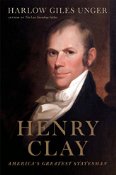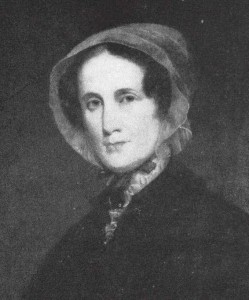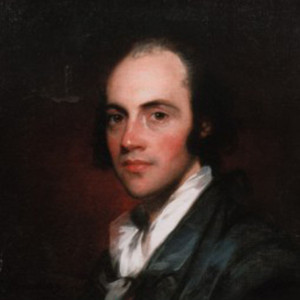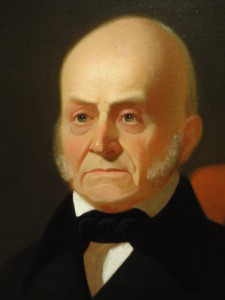
Henry Clay by Harlow Giles Unger
 Author, Harlow Giles Unger does not disappoint with his latest biography of American Statesman Henry Clay. Unger has made a successful second career as a very readable – and credible – biographer of noteworthy Americans from America’s first century. In doing so, he fills an important void, producing interesting, well-written, and succinct-but-not-superficial biographies of noteworthy Americans (including Lafayette, who earned the designation.) Indeed, most of Unger’s books have been reviewed here at WWTFT. And almost all of them have been read by this reviewer.
Author, Harlow Giles Unger does not disappoint with his latest biography of American Statesman Henry Clay. Unger has made a successful second career as a very readable – and credible – biographer of noteworthy Americans from America’s first century. In doing so, he fills an important void, producing interesting, well-written, and succinct-but-not-superficial biographies of noteworthy Americans (including Lafayette, who earned the designation.) Indeed, most of Unger’s books have been reviewed here at WWTFT. And almost all of them have been read by this reviewer.
This time around, Biographer Harlow Giles Unger ventures a generation or two beyond the founding era where most of his previous efforts have found fertile ground. Â Unger remarks:
Unlike the landed gentry of British subjects who founded the nation, Clay was the first true American leader. Â Born in Virginia in 1777 after independence, he began life with no birthright, no property, no standing among Virginia’s fabled first families. …
Clay was a self-made man who clawed his way up in society by dint of his hard work, ambitious nature, and keen intellect. Â Like some of his contemporary politicians, and certainly many who would follow, and some who had come before, he would selectively embellish or emphasize certain features of his upbringing, while omitting others. Â Eventually, Clay would have an official biographer, and a carefully crafted narrative would emerge, in which Clay was cast as an orphan who came from meager circumstances.
While Clay did not come from “Virginia’s fabled first families,” as Unger points out, neither was he the poor orphan that he portrayed himself to have been.  However, his family was attended with more than its share of tragedy, and his biological father did die when Clay was very young.  As was the custom in that time, his mother quickly remarried. By all accounts his family was not destitute, but rather a well-respected member of the Virginia planter class. Additionally, his step-father treated him well.
Although not an “orphan,” his mother and step-father did leave him in Virginia when they relocated to Kentucky. Unger surmises that this was because the young Henry suffered from consumption. Other biographers do not offer an explanation.  In any case, they did not leave him in dire circumstances. His step-father got him temporary employment working in a store, until an opening became available in the Virginia Court of Chancery, where he used his influence to get young Clay a position. It was there that Clay attracted the attention of the famous George Wythe – signatory of the Declaration of Independence and an attendee at the Constitutional Convention.  Clay worked for the arthritic Wythe as an amanuensis.  Wythe, impressed with his scribe, eventually became his mentor, and helped to educate Clay in the study of law.  Eventually, Clay joined his family in Kentucky where he started a successful law practice.
Unger describes Clay as a hard-charging, hard-drinking, card player who won much more than he lost. However, there was more to Clay than his wild side. There was also a razor wit and a keen intellect. Abraham Lincoln considered Clay the “ideal” statesman.
… the man for whom I fought all my humble life. His views and measures were always the wisest.
The reason that Lincoln appreciated Clay so much, stemmed from Clay’s indefatigable efforts to keep the union together and forge compromises. He believed that politics was the art of the possible. Like Lincoln, holding the Union together was Clay’s lodestar.
Clay as a person was emblematic of the problems facing the young nation. He struggled with the slavery issue, as had Washington and others before him.  He owned slaves, yet while not an abolitionist, opposed slavery as something to be gradually abolished. And he tried to put forth practical ideas for accomplishing this — which failed to gain traction. He held two irreconcilable views: national unity and the emancipation of slaves. His loathing of slavery and his efforts to put forward concrete plans for ending the peculiar institution, cost Clay election to the presidency several times. When faced with pragmatists from the North or South, who urged him to pick a side, Clay is famously quoted to have replied,
I’d rather be right than president.
 But Clay’s four presidential runs were to come later in his political career, after he moved to Kentucky.  Of more significance to Clay than politics was his marriage to Lucretia Hart. No beauty, but a woman of character, compassion, and intelligence, she was the perfect match for Clay, who saw beyond her plain appearance. What might have begun as a practical matter, (Lucretia came from a wealthy family), blossomed into something much more.  They would form a happy partnership that lasted more than 50 years and produced 11 children.
But Clay’s four presidential runs were to come later in his political career, after he moved to Kentucky.  Of more significance to Clay than politics was his marriage to Lucretia Hart. No beauty, but a woman of character, compassion, and intelligence, she was the perfect match for Clay, who saw beyond her plain appearance. What might have begun as a practical matter, (Lucretia came from a wealthy family), blossomed into something much more.  They would form a happy partnership that lasted more than 50 years and produced 11 children.
Lucretia’s wealth and social connections helped establish her new husband, but Clay’s success in practicing law was all his own. His clients included Andrew Jackson and Noah Webster. Although he handled mundane legal matters like debt collection (for Jackson) and represented Webster’s copyright in the west, and Clay’s bread and butter was handling legal disputes around conflicting land claims, the sexy, if low-paying work, involved representing those charged with criminal behavior – like Aaron Burr.
Burr was wanted for murder in two states for having killed former Treasury Secretary, Alexander Hamilton in a duel.  Burr had been the sitting vice president at the time.  Under relentless legal (New York and NJ politicos fabricated a murder charge, despite dueling being legal in NJ where the duel had taken place) and political pressure Burr resigned and decamped.
Despite the gravity of his situation, Burr wrote to his son-in-law:
In New York I am to be disenfranchised and in New Jersey hanged. Â Having substantial objection to both, I shall … seek another country.Â
At that time, as Unger explains:
Most Americans still referred to each state as a “country.”
The story of how a vindictive Thomas Jefferson tried to unleash the full power of the fledgling U.S. government against Burr is covered at some length in Ken Newmyer’s The Treason Trial of Aaron Burr reviewed here. Jefferson’s perfidy (on a personal level) against Burr – concocting bogus charges of treason with General James Wilkinson, is also covered in Unger’s terrific biography John Marshal reviewed here.
Clay successfully defended Burr before two grand juries … pro bono.  Although convinced of Burr’s innocence, Clay declined to defend him before a third (which also threw out the case) as he had been appointed to fulfill the remaining 3 months of a Kentucky senator’s term and was moving to Washington and wanted to avoid a conflict of interest with his duties as senator.
 A total of four grand juries would reject the case against Burr. Â But Clay would fall under Jefferson’s glib spell and chose to believe the falsified documents produced by Jefferson as “proof” of Burr’s treason.
A total of four grand juries would reject the case against Burr. Â But Clay would fall under Jefferson’s glib spell and chose to believe the falsified documents produced by Jefferson as “proof” of Burr’s treason.
Once again, Jefferson does not fare well in the telling of these events. He appears as petty and vindictive. What Jefferson could not forgive was Burr’s refusal to acquiesce in the election of 1800. (Jefferson was only elected upon the 36th ballot in the House of Representatives – largely as a result of Hamilton’s intercession.)
Clay’s outspoken behavior in the Senate as well as earlier bold opposition to President John Adams’s infamous Alien and Sedition Acts, made Clay very popular in Kentucky. He was returned to the Senate to complete the term of a Buckner Thruston, who had resigned to accept a federal judgeship.
Clay was subsequently elected to the House of Representatives where he was to become the youngest and the first and only freshman congressman elected Speaker of the House.  In that role, Clay would turn a raucous, undisciplined body, into a well-oiled, powerful (and perhaps preeminent) branch of the federal government.
Young as he was, Clay’s baritone voice boomed authority, to which he added rapier-like wit and an astonishing command of the law. Â Seizing control of the Rules Committee, he created a new set of strict–if byzantine–procedures that gave him and future Speakers command of the entire legislative process. Â Clay named committee chairs and members and, through them, indirectly decided whether and when a bill could come to the floor for a vote. Â He selected which members could speak for or against it on the floor, when they could speak, and for how long. One veteran congressman who spoke beyond his allotted time heard the thunder of Clay’s gavel and felt the sting of his lightning tongue.
“I speak to posterity!” the old man protested.
“Yes,” Clay shot back, “and you seem resolved to continue speaking until the arrival of your audience.”
The ensuing roar of laughter send the old man slumping into his seat in a red-faced funk.
In one interesting anecdote, Unger recounts how Clay ordered the sergeant-at-arms to remove powerful Virginia Representative, John Randolph’s dogs from the chamber. Â Randolph was an imposing and eccentric, if not insane figure in the House. Â When North Carolina representative Willis A. Alston complained about the two large hunting dogs that regularly accompanied Randolph on the floor of the House, Randolph beat him savagely with a cane.
Clay–standing as tall as his six-foot-one-inch stature permitted — would have none of it, and, as other House members gasped at his audacity, he ordered the sergeant-at-arms to remove Randolph’s dogs. Rendered all but apoplectic by Clay’s impertinence, Randolph waited for Clay to leave the chamber, then blocked his way, snarling, “I never sidestep skunks.”
“I always do,” Clay smiled as he stepped nimbly around Randolph and walked away–postponing the inevitable duel that would climax their festering enmity.
Clay transformed the House into the body it is today. Â A master politician, Clay even figured out how turn some prospective political enemies into allies.
… Clay was too savvy a politician to ignore potential opponents such as Daniel Webster, who entered the House in 1813 representing his native state of New Hampshire. Â By placing Webster on the powerful foreign relations committee, he converted a potential political foe into a loyal friend.
In the House, Clay would also gain notoriety as a Hawk, leading the charge in a resolution to declare war on Britain in 1812. It was the first time in American history Congress exercised its constitutional prerogative to declare war.
Federalist Congressman Josiah Quincy said that Henry Clay,
“…Â was the man whose influence and power more than that of any other produced the War of 1812 between the United States and Great Britain.”
In 1814 Clay resigned as Speaker of the House and answered the call of his president (James Madison) to join John Quincy Adams and Albert Gallatin in representing the United States to negotiate the peace.
 Clay took full advantage of the delays attendant to coming up with a suitable venue for the negotiations and toured Sweden, Denmark, Germany and Holland before arriving in Ghent where the negotiations would be held. Clay continued his gambling and drinking too, initially frustrating his more straight-laced companions.
Clay took full advantage of the delays attendant to coming up with a suitable venue for the negotiations and toured Sweden, Denmark, Germany and Holland before arriving in Ghent where the negotiations would be held. Clay continued his gambling and drinking too, initially frustrating his more straight-laced companions.
Making matters worse, Adam’s room at the Hotel des Pay-bas was next door to Clay’s, which became the site of card parties and drinking bouts that often continued until dawn. By then Adams was rising to read his Bible. For some time Clay and Adams considered each other insufferable — the one an insufferable libertine, the other an insufferable Puritan. Ironically it was the neophyte Clay, not the seasoned Adams, who held the American delegation together. While the Harvard intellectual Adams filled his spare hours poring over impenetrable texts on history, art, and philosophy, the other American delegates had reached the end of their patience with the British negotiating tactics, which aimed at wearing down the Americans with delays by reexamining and questioning every punctuation mark. All but Adams were ready to break off negotiations and return home to their families. They had toured Ghent’s monuments to the point of boredom. Â Only Clay’s ebullience, entertaining character, card games, and drinking parties made life tolerable enough for the other American delegates to remain. He was a master at calming frayed nerves and uniting people.
Ultimately, a treaty that resolved few of the outstanding questions was signed on Christmas Eve 1814. Both sides agreed to return to pre-war status quo, return all prisoners, and address the rest later.
Clay and Adams would cross swords again, after their return to the United States. However, they would also become life-long friends and political allies too. In a move that damaged both men, Adams would nominate Henry Clay as Secretary of State — considered to be a stepping stone to the presidency. Andrew Jackson, Clay’s bitter foe, would quickly label this a “corrupt bargain.” Â The insinuation would never completely fade.
Clay would never become president. Â His steadfast and complicated position on slavery – neither for it, nor for abolition, would win no friends in either North or South. Â He would spend his life trying to preserve the Union, and become known as “the great pacificator,” for his efforts in Congress to engineer compromises. Along the way, he earned the lasting enmity of former ally John C. Calhoun, and enjoyed the steadfast friendship of Daniel Webster.
Along with Daniel Webster and John C. Calhoun, Clay formulated the Missouri Compromise of 1820 and the Compromise of 1850, and avoided civil war.
Clay was a complicated figure, who served in numerous roles, Speaker of the House, de facto Senate majority leader, diplomat, Secretary of State, and four-time presidential candidate. In all he did, he was consistent in his desire to hold the Union together at all costs. Some have said that the compromises he engineered enabled it to survive the inevitable cataclysm of civil war. Those compromises gave the country the time it would need to grow strong enough to endure the tempest.
 The posts are coming!
The posts are coming!


0 comments
Kick things off by filling out the form below.
Leave a Comment